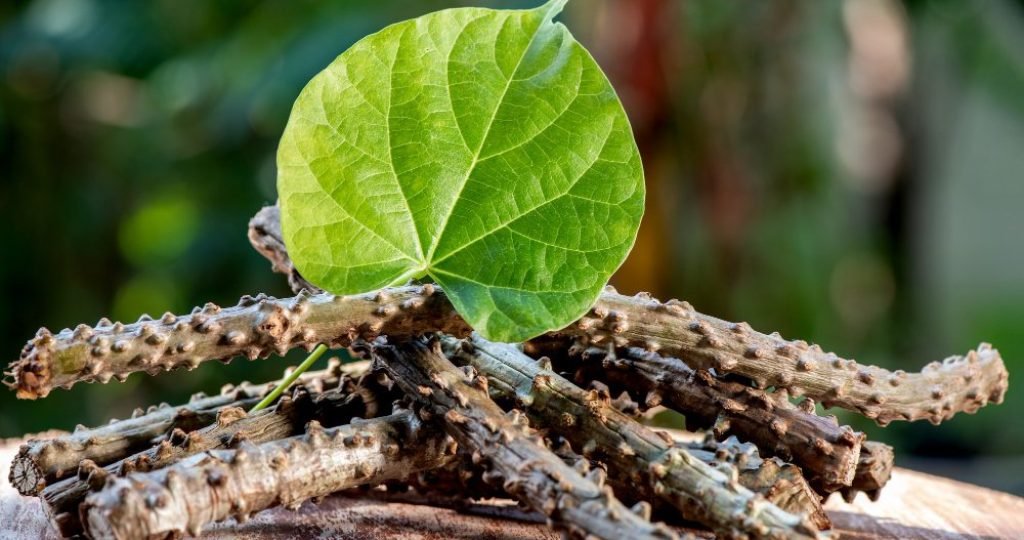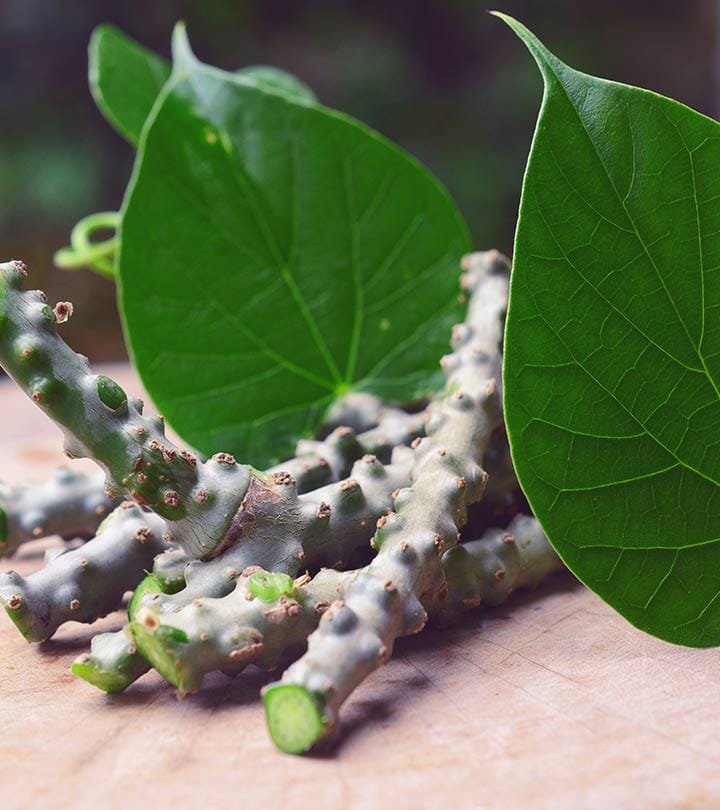06 July 2025
Category: Ayurvedic & Integrative Therapeutics I
Traditional Medicine in Modern Health Research
Written By:
Shweta Rajguru (PharmD, purs.)
Reviewed By:
Ayurvedacharya
Dr. Gaurav Pahare BAMS

Guduchi, also known as Gulvel and Tinospora cordifolia in scientific nomenclature, is a large, smooth, deciduous climbing shrub in the Menispermaceae family. It is considered to be “Rasayana,” a rejuvenator in Ayurvedic medicine, also referred to as “Amrita” (the nectar of immortality). Guduchi has many names, including Amritavalli, Madhuparni, Guduchika, Chinnobhava, Vatsadani, Tantrika, and Kundalini. The Sanskrit name of this shrub, Guduchi, literally means ‘one that protects the entire body.’ Medicinally, the stem of Guduchi is the most widely used part of the shrub, valued for its high concentration of bioactive compounds; however, the roots and leaves are also utilized in some traditional preparations. Guduchi has long been used for its wide range of health benefits, from boosting immunity to reducing inflammation. In recent decades, modern pharmacological research has begun validating many of these traditional claims.
Health Benefits of Guduchi
Immunomodulatory Effects
Guduchi is renowned for its ability to boost immune function. The immune-stimulating potential of Guduchi (Tinospora cordifolia) has been well documented through recent scientific research. The stem of Guduchi was found to significantly enhance the immune response by promoting the secretion of key pro-inflammatory cytokines, including IFN-γ, TNF-α, and IL-1β, by murine macrophages, increasing phagocytic activity, and modulating cytokine production. It was notably used as an immune booster during the COVID-19 pandemic in several integrative medicine protocols in the Indian subcontinent.
Antipyretic and Anti-inflammatory Properties
Guduchi has shown significant anti-inflammatory and antipyretic effects in animal studies. Its aqueous stem extract reduced inflammation and fever comparably to diclofenac and paracetamol. The observed effects are believed to result from the dual inhibition of cyclooxygenase (COX) and lipoxygenase (LOX) pathways, key players in the inflammatory cascade. Furthermore, the presence of flavonoids, alkaloids, and protoberberine compounds in the extract is thought to contribute to the suppression of prostaglandin synthesis and modulation of pyrogenic cytokines. Some ghee-based formulations, like Guduchi Ghrita, also showed antipyretic activity.
Anti-diabetic Effects
Some studies evaluate and support the antidiabetic claims of Tinospora cordifolia, emphasizing its preventive, curative, and restorative potential in managing diabetes and its complications. Research highlights multiple mechanisms of action, including improvement of insulin secretion, enhanced insulin sensitivity, inhibition of α-glucosidase and α-amylase, modulation of glucose metabolism, suppression of oxidative stress, and immunomodulatory effects that may help preserve pancreatic β-cell function. Additionally, Tinospora is reported to alleviate diabetic complications such as neuropathy, nephropathy, retinopathy, and cardiovascular damage, while also offering protection to vital organs and improving overall quality of life in diabetics. Despite these claims, some research shows that guduchi is not up to mark but has a mild hypoglycemic action.
Hepatoprotective Effects
Guduchi Satwa, an Ayurvedic formulation prepared from different species of Tinospora (including T. cordifolia, T. sinensis, and Neem-Guduchi), demonstrates hepatoprotective potential against alcohol-induced liver toxicity. The study shows that each form of Satwa provides distinct protective effects on liver function, lipid profile normalization, and oxidative stress markers. The results support the potential use of a combined formulation of these Satwas as an effective liver tonic, though clinical trials in humans are needed to confirm efficacy and safety.
Antioxidant and Anti-aging Activity
Some studies claim that the Tinospora cordifolia exhibits strong antioxidant activity and provides protective effects against oxidative stress and liver damage caused by N-nitrosodiethylamine (DEN)-induced hepatocellular carcinoma in rats. It was claimed that Tinospora significantly reduced lipid peroxidation (LPO) levels and restored both enzymatic antioxidants (such as SOD, CAT, and GPx) and nonenzymatic antioxidants (including GSH, Vitamin C, and Vitamin E) to near-normal levels.
Respiratory Infections and COVID-19
Guduchighana Vati, an Ayurvedic formulation made from Tinospora cordifolia (Guduchi), is a safe and potentially effective treatment for asymptomatic and mild-to-moderate cases of COVID-19. In a randomized controlled pilot study, patients receiving Guduchighana Vati showed a higher rate of RT-PCR negativity (93.3%) by day 10, faster clinical recovery, and significant reduction in inflammatory marker IL-6, compared to those receiving standard care with hydroxychloroquine.
Adjunct in Autoimmune Conditions
Some research shows that Tinospora cordifolia exhibits potent anti-arthritic effects in a rat model of rheumatoid arthritis (adjuvant-induced arthritis), primarily by modulating immune responses and preventing joint and bone damage. Tinospora treatment significantly reduced the expression of pro-inflammatory cytokines (IL-1β, IL-6, IL-17, TNF-α), chemokines, and joint-destructive enzymes like MMP-9, while restoring the balance of bone remodeling markers by decreasing RANKL and increasing osteocalcin. Additionally, it lowered the frequency of IL-17/IFN-γ-producing T cells, suggesting a downregulation of Th17-mediated immune responses.
Antiatherosclerotic effect
Some studies claim that the ethyl stem of Tinospora cordifolia exhibits significant anti-atherosclerotic effects in rats fed a high-fat diet, primarily by improving lipid metabolism, reducing inflammation, and protecting cardiovascular tissue. Guduchi led to a marked reduction in total cholesterol, triglycerides, LDL, and VLDL levels, while significantly increasing HDL and total protein levels. It also improved liver enzyme profiles and increased blood clotting time, indicating protective effects against thrombosis.
Available Dosage Form
- Capsules and Tablets
- Decoctions (Kadha)
- Guduchi Satva (dry extract)
- Juice or Giloy juice
- Topical applications for skin conditions
Safety and Precautions
Generally Recognized as Safe (GRAS)
Guduchi is considered safe for long-term use in appropriate doses.
However, some rare case reports suggest hepatotoxicity with prolonged high-dose use, especially in individuals with pre-existing liver disorders or those taking multiple herbal supplements.
Use with Caution In
Autoimmune diseases (may overstimulate the immune system in some cases)
Pregnant or breastfeeding women (insufficient safety data)
Patients on immunosuppressants or steroids
Conclusion
Guduchi (Tinospora cordifolia) is a multi-functional herb with centuries of traditional use and growing scientific validation. From immune enhancement and metabolic support to liver protection and anti-inflammatory actions, its therapeutic potential is immense. With increasing standardization and preclinical and clinical studies, Guduchi is poised to become a key player in integrative and preventive health strategies.
References
Technical Dossier on Guduchi (Tinospora Cordifolia), Ministry of Ayush, Government of India, https://ayush.gov.in/resources/pdf/quality_standards/guduchi_Book-Dossier.pdf
Alsuhaibani S, Khan MA. Immune-Stimulatory and Therapeutic Activity of Tinospora cordifolia: Double-Edged Sword against Salmonellosis. J Immunol Res. 2017; 2017:1787803. Doi: 10.1155/2017/1787803. Epub 2017 Nov 26. PMID: 29318160; PMCID: PMC5727750.
Sumanlata, Suman A, Sharma RK et.al. Evaluation of anti-inflammatory and antipyretic effect of aqueous extract of tinospora cordifolia in rats. International Journal of Research and Review. 2019; 6(8):340-346.
Ashok BK, Ravishankar B, Prajapati KP, et al, Antipyretic activity of Guduchi Ghrita formulations in albino rats, AYU, Jul-Sep 2010, Vol 31, Issue 3
Rohit S, Vijay K, Ashok BK, et al, Hypoglycemic and anti-hyperglycemic activity of Guduchi Satva in experimental animals. AYU (An International Quarterly Journal of Research in Ayurveda) 34(4):p 417-420, Oct–Dec 2013. | DOI: 10.4103/0974-8520.127726
Sharma R, Amin H, Galib, Prajapati PK, Antidiabetic claims of Tinospora cordifolia (Willd.) Miers: critical appraisal and role in therapy, Asian Pac J Trop Biomed 2015; 5(1): 68-78
Sharma R, Bolleddu R, et al, In-Vitro α-amylase, α-glucosidase Inhibitory Activities and In-Vivo Anti-Hyperglycemic Potential of Different Dosage Forms of Guduchi (Tinospora Cordifolia [Willd.] Miers) Prepared With Ayurvedic Bhavana Process. Front Pharmacol. 2021 May 10;12:642300. Doi: 10.3389/fphar.2021.642300. PMID: 34040519; PMCID: PMC8141809.
Yadav Chandra Kishor, Hegde Prakash L. Hepatoprotective Activity of Patra Swarasa of Guduchi (Tinospora Cordifolia) Against Paracetamol Induced International Journal of Ayurveda and Pharma Research. 2024; 12(6):18-23
.Chavan T, Ghadge A, Karandikar M, et l, Hepatoprotective Activity of Satwa, an Ayurvedic Formulation, Against Alcohol-induced Liver Injury in Rats. Altern Ther Health Med. 2017 Jul; 23(4):34-40. PMID: 28646813.
Chavan T, Khadke S, Harke S, et al, Satwa from three Tinospora species exhibits differential hepatoprotective activity against repeated acetaminophen dosing in rats, Journal of Pharmacy Research, Volume 6, Issue 1, 2013, Pages 123-128, ISSN 0974-6943, https://doi.org/10.1016/j.jopr.2012.11.026
Shukla U, Ujjaliya N, Gupta P, Khare V, et al. Efficacy and safety of Guduchighana Vati in asymptomatic and mild‑to‑moderate cases of coronavirus disease‑19: A randomized controlled pilot study. AYU 2022;41:188-96.
Shukla U, Ujjaliya N, Gupta P, et al, Efficacy and safety of Guduchighana Vati in asymptomatic and mild-to-moderate cases of coronavirus disease-19: A randomized controlled pilot study. Ayu. 2020 Jul-Sep;41(3):188-196. Doi: 10.4103/ayu.ayu_11_21. Epub 2022 Feb 24. PMID: 35370379; PMCID: PMC8966758.
KM Sannegowda, SH Venkatesha, KD Moudgil, Tinospora cordifolia inhibits autoimmune arthritis by regulating key immune mediators of inflammation and bone damage, Int J Immunopathol Pharmacol. 2015 December; 28(4): 521–531. Doi: 10.1177/0394632015608248

